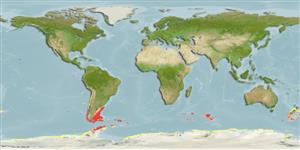Hemiarthrum setulosum Carpenter, 1876
| Native range | All suitable habitat | Point map | Year 2050 |

|
| This map was computer-generated and has not yet been reviewed. |
| Hemiarthrum setulosum AquaMaps Data sources: GBIF OBIS |
Google image |
No photo available for this species.
Classification / Names Κοινά ονόματα | Συνώνυμα | CoL | ITIS | WoRMS
Polyplacophora | Chitonida | Hemiarthridae
Environment: milieu / climate zone / εύρος βάθους / distribution range Οικολογία
; εύρος βάθους 0 - 380 m (Αναφ. 1875). Polar
Distribution Χώρες | Περιοχές FAO | Οικοσυστήματα | Παρουσίες | Εισαγωγές
Southwest Atlantic, Southern Pacific and the Antarctic.
Length at first maturity / Μέγεθος / Weight / Age
Γεννητική Ωρίμανση: Lm ? range ? - ? cm
Life cycle and mating behavior Γεννητική Ωρίμανση | Αναπαραγωγή | Γεννοβολία | Eggs | Γονιμότητα | Larvae
Main reference
Αναφορές | Συντονιστής | Συνεργάτες
Kaas, P. and R.A. van Belle 1985 Monograph of the Living chitons (Mollusca: Polyplacophora). Vol.1. Order Neoloricata: Lepidopleurina. E.J. Brill publishers, Leiden. 240 p. (Αναφ. 1875)
IUCN Red List Status
(Αναφ. 130435: Version 2025-1)
CITES status (Αναφ. 108899)
CMS (Αναφ. 116361)
Threat to humans
Human uses
| FishSource |
Εργαλεία
Περισσότερες πληροφορίες
Max. ages / sizes
Length-weight rel.
Length-length rel.
Length-frequencies
Mass conversion
Αφθονία
Διαδικτυακές πηγές
BHL | BOLD Systems | CISTI | DiscoverLife | FAO(Publication : search) | Fishipedia | GenBank (genome, nucleotide) | GloBI | Gomexsi | Google Books | Google Scholar | Google | PubMed | Δέντρο Ζωής | Wikipedia (Go, αναζήτηση) | Zoological Record


